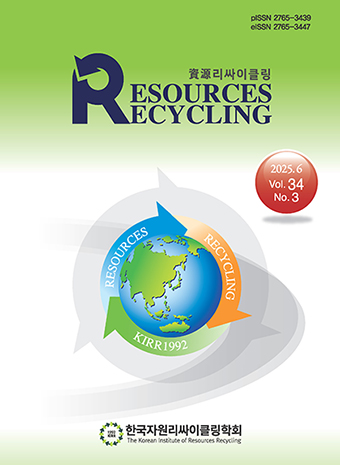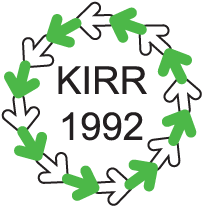Research Paper
Sun-Mok Lee, Daekeun Lee, Woo Sung Yum, et al., 2023 : Characteristics Analysis of Chlorine Bypass Dust and Water-washed Residue, J. of Korean Inst. of Resources Recycling, 32(5), pp.44-51.
10.7844/kirr.2023.32.5.44Piotr Smarzewski and Krystian Błaszczyk, 2024 : Influence of Cement Kiln Dust on Long-Term Mechanical Behavior and Microstructure of High-Performance Concrete, Materials, 17(4), 833. https://doi.org/10.3390/ma17040833
10.3390/ma1704083338399084PMC10890526Karolina Wojtacha-Rychter, Magdalena Krol, Małgorzata Gołaszewska, et al., 2022 : Dust from chlorine bypass installation as cementitious materials replacement in concrete making, J. Build. Eng., 51, pp.1-20.
10.1016/j.jobe.2022.104309Youngmin Yun, Nari Yeom, Kabsoo Lee, et al., 2017 : Preparation of KCl through Removal of Heavy Metals from Chlorine By-Pass Dust, J. of Korean Inst. of Resources and Recycling, 26(2), pp.11-17.
10.7844/kirr.2017.26.2.11Lukáš Kalina, Vlastimil Bílek Jr., Jiří Másilko, et al., 2018 : Cement Kiln By-Pass Dust: An Effective Alkaline Activator for Pozzolanic Materials, Materials, 11(9), 1770.
10.3390/ma1109177030235786PMC6164556Katarzyna Borek, Przemysław Czapik, Ryszard Dachowski, 2023 : Cement Bypass Dust as an Ecological Binder Substitute in Autoclaved Silica-Lime Products, Mater., 16(316), pp.1-13.
10.3390/ma1601031636614654PMC9822286Global Cement Magazine, Global Cement News, Reshape Your Footprint. http://www.cfic.dz/images/telechargements/eGCFeb2022ns.pdf, February 15, 2022.
Eva Terpáková1, Nadežda Števulová1, 2020 : Trends in the Use of Cement Bypass Dusts for their Application in Construction, Key Eng. Mater., 838, pp.39-45.
10.4028/www.scientific.net/KEM.838.39Seung-Heun Lee, Yang-Yi Woo and Do-Young Cho, 2015 : Applications and Technical status of Solidification, J. Rec. Const. Resources, 10(2), pp.26-32.
Byung-Sik Chun and Jin-Chun Kim, 2000 : A Study on the Application of Soilcrete Cement for Improvement of Marine City, J. Ocean Eng. Technol., 14(3), pp 72-77.
Chul-Jin Yang, Jun-Seok Bae, Jong-Sik Lee, et al., 2018 : Analysis of Mechanical Properties of Solidified soil using Pig Iron Slag, J. Korean Geosynth. Soc., 17(1), pp.1-10.
Kwang-Wu Lee, Jae-Hyun Park, Dae-Sung Cho, et al., 2023 : A Study on the Utilization Method in the SCW Method using Supplementary Cementitious Materials, J. Korean Geosynth. Soc., 22(3), pp.87-95.
Karolina Wojtacha-Rychter, Magdalena Krol, Adam Smolinski et al., 2022 : Dust from chlorine bypass installation as cementitious materials replacement in concrete making, J. Build. Eng., 51(1). pp.1-20.
10.1016/j.jobe.2022.104309J. Strunge, D. Knoefel, I. Dreizler, 1985 : Effect of alkalies and sulfur on the properties of cement, Zem. Kalk Gips, 38(3), pp.150-158.
M. A. Daous, 2004 : Utilization of Cement Kiln Dust and Fly Ash in Cement Blends in Saudi Arabia, Eng. Sci., 15(1), pp.33-45.
10.4197/Eng.15-1.3Przemysław Czapik, Justyna Zapała-Sławeta, Zdzisława Owsiak, et al., 2020 : Hydration of cement by-pass dust, Constr. Build. Mater., 231, pp.1-9.
10.1016/j.conbuildmat.2019.117139- Publisher :The Korean Institute of Resources Recycling
- Publisher(Ko) :한국자원리싸이클링학회
- Journal Title :Resources Recycling
- Journal Title(Ko) :자원리싸이클링
- Volume : 33
- No :4
- Pages :15-21
- Received Date : 2024-07-09
- Revised Date : 2024-07-30
- Accepted Date : 2024-07-31
- DOI :https://doi.org/10.7844/kirr.2024.33.4.15



 Resources Recycling
Resources Recycling








